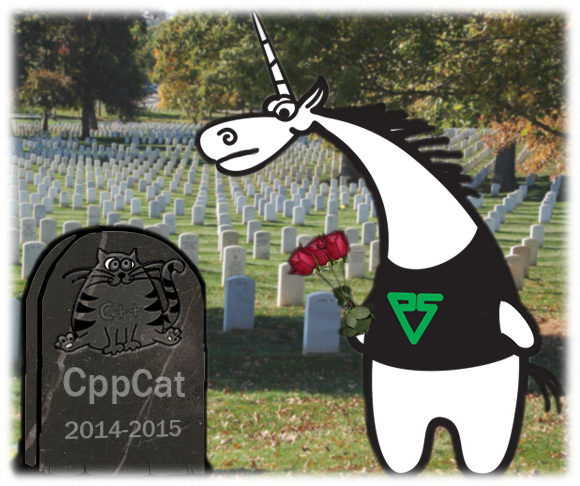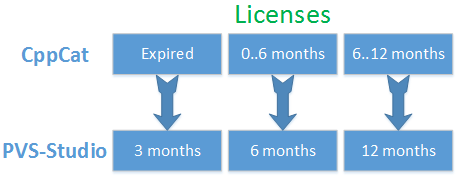We close the project CppCat

Just over a year ago, we decided to conduct an experiment and launch an alternative to the PVS-Studio static code analyzer for small teams and individual developers. So there was a very inexpensive analyzer called CppCat. Now we can summarize this experiment and admit that it was unsuccessful. Over a period of just over a year, he brought about as much money as was spent on its development, promotion and support. Thus, the project is unprofitable. After all, we could use the time spent (the most valuable resource) to improve PVS-Studio. We have to close the CppCat project and focus on PVS-Studio. I hope readers will be interested in someone else's experience in implementing a new business idea. Negative experience is also a rewarding experience.
CppCat was announced in January 2014: " Alternative to PVS-Studio for $ 250 ". We wanted to present to the world an easy to set up and inexpensive static code analyzer for mass use. It was an interesting project and an interesting marketing experiment.
We were unlucky and we decided to focus on our main project PVS-Studio . This does not mean that we will not do new experiments. For example, we plan to try to create a static analyzer for C # over time. However, now priority will be given to PVS-Studio, and CppCat will cease to exist.
')
Reasons for closing the project
Many books and articles promote the idea of making a software product inexpensive, but massive. Sometimes it works. The rapid development of the App Store is proof of that. Not for all this is suitable, but until you try, you do not know.
We received a very large number of letters and comments that PVS-Studio is too expensive. We were agitated to sell PVS-Studio at a price of $ 300- $ 500. We were promised that as soon as we do this, a line of buyers will line up to us. And those who wrote us a letter will be among the first in this queue.
At the same time, very often we were sent a link to Joel Spolsky’s article " Camels and Sandbox ". Why - is not clear. As for me, the article does not promise success with such a pricing policy. Nevertheless, I decided to mention “Camels and the sandbox”, since we were given this article as an argument more than ten times.
The flow of comments and letters made us think about the idea of making the static analysis tool cheap. We were told that we are losing a huge reservoir of developers working in small companies or simply being freelancers or individual developers. And we ourselves were attracted by the idea of going towards a mass inexpensive product.
However, we didn’t just want to reduce the price of PVS-Studio. In the end, PVS-Studio is stably acquired by companies and that means everything is good with this tool and price.
And then we came up with CppCat. We made it so that PVS-Studio was convenient for working with large projects, and CppCat with small ones. After all, it makes no sense to select clients from more expensive PVS-Studio. However, it fully meets the needs of small development teams working in the Visual Studio environment.
Moreover, in order to act for sure, we made the price lower than we were recommended. As I said, we were written about $ 300- $ 500. We made $ 250.
The first "bell" that we made a mistake sounded immediately. The fact is that for some time we wrote out the contacts of all people who said that the PVS-Studio tool is interesting, but it is unacceptably expensive. When CppCat appeared, we contacted these people and offered them to purchase it for $ 250. Such a proposal was sent to approximately 20 programmers. And what do you think the result is? Bought two.
This means that the static analyzer was really not needed by all these people, and they left their recommendations just like that. In general, the following trend has long been noticed. Those who need to - buy the product. Those who do not need, discuss too high a price and disadvantages of the tool. Naturally, we were not the first to notice this. For example, I like the quote from the article " Abandoned the demo and freemium - and weed out a bunch of slag ":
Elba (online accounting system) at the start cost 300 rubles per month, and even then there were people who considered this price to be transcendental. In this case, the first buyer paid an annual subscription before we closed access to some of the functions at a free rate. This example perfectly illustrates two types of potential customers:
- A representative of the target audience who would hypothetically take advantage of your offer if he were paid extra for it;
- A real potential customer, to whom your instrument will really benefit.
Although it is written about a completely different business, the coincidence is complete. However, it was too late to stop, and our company started promoting CppCat on the Internet.
A discussion of how and what was done to attract interest in CppCat is beyond the scope of this article. However, I would like to note that a lot of work was done, for which we spent more time for some time than on the promotion of PVS-Studio.
CppCat began to sell, but sales volumes completely disappointed us. We cannot precisely state the reason for the failure of the new analyzer, but we will state our version.
The static analyzer is not demanded in small projects for the following complementary reasons:
- The density of errors in small projects is less than in large ( more ).
- In a small project, one or two people know all the code and it is easy for them to look for any mistake. In large projects, no one knows how everything works. Because of this, finding and fixing errors is much more expensive. Every change in the code can produce unexpected effects that no one can foresee. Therefore, if the tool helps to prevent at least 10% of errors, this is already a huge saving of energy and time. In small projects, there is simply no such problem.
- The level of programming culture of individual developers and small teams is lower than in large companies. Theoretically, we should undertake the mission of promoting a static analysis methodology among them. Then there will be much more customers. But in practice it is unrealizable. This level of missionary is not available to our company. New trends in programming practice are able to promote only such major players as Microsoft or Apple.
The bottom line is the following picture. Companies buy and use PVS-Studio with pleasure. Some companies acquire licenses for more than 50 developers. Many of them renew licenses. There are already those who use PVS-Studio for the fourth year in a row. Let me remind you that our product was formed in such a form as it is now by 2011.
Individual developers do not buy CppCat. The income received from CppCat is completely disproportionate to the income from sales of PVS-Studio. Revenues from sales of CppCat are approximately equal to the costs of development, support and promotion.
About half a year ago, the futility of CppCat sales became obvious, but we did not rush to immediately abandon the product. I wanted to try to use it somehow for promotional purposes. Unfortunately, we were unable to come up with anything particularly interesting. The only idea was the free distribution of academic licenses. I will dwell on this in a bit more detail.
We started giving CppCat to students and teachers for free. The idea was that students would talk about the tool at work, discuss on the forums or at least someone would leave some kind of tweet. In general, some discussion will arise and more people will know about the analyzer.
The result is zero. Nowhere is there any mention of our share and CppCat. On the Internet is only what we ourselves have posted. This type of advertising also failed.
By the way, I want to praise students from Ukraine and Belarus. They most actively requested licenses for CppCat. Perhaps the economic crisis makes students think more seriously about their careers, and they are actively exploring tools and generally truly learning to be programmers. There is also a crisis in Russia, but our students turned out to be lazy and inactive.
Summarize. We have failed to make CppCat a well-selling product. We could not somehow advertise at his expense. We decided to no longer spend resources on the development and support of this tool. We are closing this project as unpromising.
What will happen to CppCat users
Closing the project, you need to think about the users who bought the license. In this sense, a small number of users is good. I think we can safely close the project.
Those who have purchased a license for CppCat will receive a license for PVS-Studio for the time being. We will issue licenses according to the following principle:
- Who has expired the CppCat license, and he hasn’t renewed it, get the PVS-Studio license for a period of 3 months.
- The license holders, which expire in less than 6 months, receive a license for PVS-Studio for a period of 6 months.
- The license holders, which expire in 6-12 months, receive a license for PVS-Studio for a period of 1 year.
For greater clarity, I depict this as an image:

Another user group is students who receive free versions. For them, we can not offer anything. They can use CppCat until the end of the license. Perhaps in the future we will offer for students some other action to get a free analyzer. But I will not promise anything in advance.
For all questions, CppCat users can contact us in the mail: support@viva64.com
What's next?
We are not at all saddened by the situation with CppCat. On the contrary, we are more than ever determined to develop PVS-Studio, because we regularly receive words of support from our customers who use our code analyzer. And new projects from our team are already in draft.
UPDATE. Eugene wrote a short note, which partially overlaps with questions of the utility of different directions. It may be interesting: I finally understood what a unit-economy is .
Source: https://habr.com/ru/post/256637/
All Articles